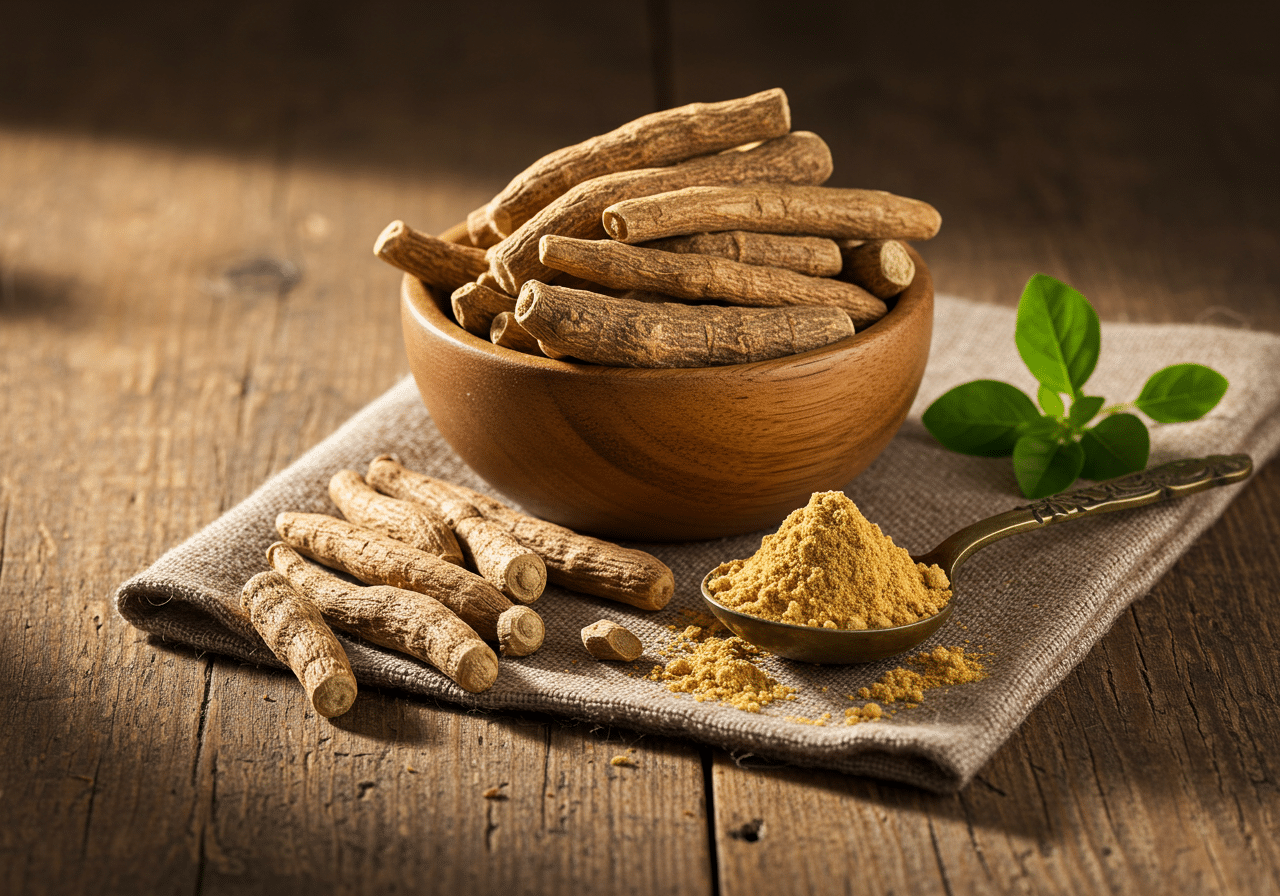Top 9 Ashwagandha Benefits for Stress, Sleep, and Strength

You’ve probably heard about ashwagandha’s growing reputation as a natural solution for modern wellness challenges, but understanding its specific benefits can help you make an informed decision about incorporating it into your routine. This ancient adaptogenic herb doesn’t just offer vague promises of better health—it delivers measurable improvements in three critical areas that affect your daily life. The scientific evidence behind ashwagandha’s effectiveness might surprise you with its scope and consistency.
Reduces Stress and Anxiety Levels Naturally
When stress overwhelms your daily life, ashwagandha offers a natural solution that’s backed by solid scientific evidence. This powerful adaptogen helps your body cope with stress by regulating the hypothalamic-pituitary-adrenal axis and reducing cortisol levels—your primary stress hormone.
Clinical trials consistently demonstrate ashwagandha benefits through significant reductions in anxiety symptoms. Studies using the Hamilton Anxiety Rating Scale and DASS-21 scores show measurable improvements in participants taking 240-600mg daily over several weeks. In one randomized controlled trial, participants experienced a 41% reduction in anxiety scores compared to just 24% in the placebo group.
You’ll experience stress relief through ashwagandha’s interaction with heat shock proteins and stress-activated pathways.
Beyond stress management, research suggests additional ashwagandha benefits including lowering blood sugar levels and supporting overall mental health through mood enhancement and neuroprotective effects.
Improves Sleep Quality and Combats Insomnia
You’ll find that ashwagandha considerably reduces insomnia symptoms by helping you fall asleep faster and stay asleep longer throughout the night.
The herb naturally enhances your sleep cycles by improving both deep sleep stages and overall sleep efficiency. This means you’ll wake up feeling more rested and experience fewer sleep disturbances that typically disrupt your natural sleep patterns. Research shows that ashwagandha extract provides significant sleep improvement when taken at doses of 600 mg or higher daily for at least 8 weeks.
Reduces Insomnia Symptoms
If you’re struggling with sleepless nights, ashwagandha offers a natural solution that’s backed by solid scientific evidence. This powerful herb reduces the time it takes you to fall asleep while improving your overall sleep quality.
Clinical trials show that taking 600mg daily for at least eight weeks delivers the most significant results.
Ashwagandha benefits for women and men include enhanced mental alertness upon waking and improved sleep efficiency. The herb works by reducing anxiety levels, which often contribute to insomnia.
Unlike synthetic sleep aids, ashwagandha benefits and side effects profile shows minimal adverse reactions, making it a safer long-term option. The herb contains triethylene glycol, a compound that specifically increases nonrapid eye movement sleep patterns.
You’ll experience better sleep onset, reduced wake time during the night, and more restorative sleep overall.
Enhances Sleep Cycles
Beyond simply helping you fall asleep faster, ashwagandha fundamentally transforms your sleep architecture by enhancing each phase of your natural sleep cycles.
You’ll experience deeper, more restorative sleep that leaves you refreshed and energized. Clinical studies show that ashwagandha benefits men particularly well by supporting healthy hormones during vital overnight recovery periods. Additionally, incorporating natural remedies such as chamomile and lavender can further enhance sleep quality.
Here’s how ashwagandha optimizes your sleep patterns:
- Increases sleep efficiency – You’ll spend more time in actual sleep versus tossing and turning.
- Extends total sleep duration – Research shows measurable increases in nightly sleep hours.
- Reduces nighttime awakenings – Fewer disruptions mean uninterrupted rest cycles.
Withanolides interact with GABA receptors to promote sustained relaxation throughout the night, ensuring you cycle properly through light, deep, and REM sleep phases. Studies demonstrate that ashwagandha significantly reduces sleep onset latency, helping you fall asleep more quickly once you hit the pillow.
Enhances Muscle Strength and Physical Performance
While many supplements promise fitness gains with little scientific backing, ashwagandha delivers measurable improvements in muscle strength and physical performance that you can actually feel in the gym.
The benefits of ashwagandha extend beyond stress relief, with research showing 46kg greater bench-press strength gains and 14.5kg improvements in leg-extension compared to placebo groups. This is particularly beneficial as high-intensity interval training has been shown to enhance overall calorie expenditure and support fat loss.
You’ll also experience enhanced muscle growth, with arm muscle size increasing by 8.6cm² versus 5.3cm² in placebo users.
This powerful adaptogen reduces exercise-induced muscle damage by lowering creatine kinase levels, promoting faster recovery between workouts. The herb’s effectiveness comes from its withanolides, bioactive compounds that provide multiple biological functions including anti-inflammatory effects.
Among herbs for health, ashwagandha stands out by improving VO2 max and endurance while creating an ideal anabolic environment through cortisol reduction and enhanced energy metabolism.
Boosts Cognitive Function and Memory
When brain fog clouds your thinking or memory lapses disrupt your daily routine, ashwagandha offers scientifically-backed cognitive enhancement that goes far beyond traditional stress relief.
Clinical trials demonstrate that both acute and 30-day ashwagandha supplementation greatly improves episodic memory, attention, and executive function in healthy adults. You’ll experience better memory recall, reduced error rates, and faster reaction times compared to placebo groups. Incorporating mindful meditation alongside ashwagandha may further enhance cognitive benefits.
The ashwagandha plant’s cognitive benefits stem from multiple mechanisms:
- Neuroprotective antioxidant and anti-inflammatory properties that shield brain cells from damage.
- Enhanced neurotransmission and brain plasticity supporting improved cognitive processing.
- Reduced cortisol levels that may indirectly support thyroid health and mental clarity.
Studies using neuropsychological testing confirm these improvements, with participants showing better performance on cognitive tasks and reduced stress-related cognitive interference. Research indicates ashwagandha crosses the blood-brain barrier, making it particularly effective for supporting brain health and cognitive function.
Provides Neuroprotective Benefits Against Brain Aging
As your brain ages and faces mounting oxidative stress, ashwagandha’s powerful neuroprotective compounds actively shield your neural tissue from the cellular damage that accelerates cognitive decline.
The herb’s neuroprotective mechanisms work through multiple pathways, inhibiting toxic β-amyloid aggregation while reducing pro-inflammatory cytokines like TNF-α and IL-6 that trigger neurodegeneration.
Ashwagandha’s brain aging prevention benefits extend beyond basic protection. It stimulates neurogenesis, promoting new neuron growth while activating essential survival pathways including PI3K/AKT and mTOR.
These mechanisms enhance your brain’s resilience against age-related deterioration.
The compound withaferin A specifically targets Alzheimer’s-related processes, inhibiting tau protein accumulation and regulating heat shock proteins. Clinical studies demonstrate that ashwagandha supplementation improves immediate and general memory while enhancing information-processing speed and executive function.
Supports Cardiovascular Health and Heart Function
Your brain isn’t the only organ that benefits from ashwagandha’s protective effects—this adaptogenic herb delivers powerful cardiovascular support that strengthens your heart and improves overall circulatory health.
This ancient herbal healing remedy works through multiple pathways to protect your cardiovascular system:
- Reduces Blood Pressure and Cholesterol – Ashwagandha helps lower high blood pressure and cholesterol levels while easing chest pain symptoms, directly contributing to heart disease prevention.
- Enhances Blood Flow and Vascular Health – The herb improves circulation and reduces inflammation in blood vessels, supporting ideal heart function through better oxygen delivery.
- Provides Antioxidant Protection – Its potent antioxidant properties protect heart cells from oxidative damage and reduce inflammation-related cardiovascular risks.
Ashwagandha supports cardiovascular health by addressing multiple risk factors simultaneously, making it a thorough natural approach to heart wellness. Research shows that ashwagandha may also demonstrate anti-cancer properties, though more studies are needed to fully understand these potential effects.
Delivers Powerful Anti-Inflammatory Effects
You’re constantly battling inflammation in your body, whether from stress, poor diet, or environmental toxins that trigger harmful immune responses. Incorporating an anti-inflammatory diet can further enhance the benefits of ashwagandha’s compounds.
Ashwagandha’s potent anti-inflammatory compounds work to reduce systemic inflammation markers while simultaneously protecting your cells from oxidative damage. This dual action helps your body maintain healthier inflammatory responses and shields your tissues from the cellular harm that chronic inflammation can cause. Research shows ashwagandha extract significantly decreases pro-inflammatory cytokines like TNF-α and IL-6 while promoting anti-inflammatory TGF-β1 production in human cells.
Reduces Systemic Inflammation Markers
While chronic inflammation silently undermines your health through elevated cytokine levels and overactive immune responses, ashwagandha delivers potent anti-inflammatory effects that target the root mechanisms driving systemic inflammation.
Research demonstrates ashwagandha’s ability to considerably reduce key inflammatory markers throughout your body:
- Cytokine Suppression – You’ll experience decreased levels of pro-inflammatory cytokines including TNF-α, IL-1β, IL-6, and IL-8, which drive chronic disease progression and worsen adrenal fatigue.
- Pathway Inhibition – The herb blocks NF-κB and MAPK signaling pathways, preventing your cells from producing excessive inflammatory mediators and superoxide radicals.
- Balanced Immune Response – Ashwagandha increases anti-inflammatory cytokine TGF-β1 while reducing harmful inflammation, creating ideal immune system balance for better overall health and disease resistance. Additionally, the herb demonstrates anti-angiogenic effects by inhibiting VEGF-induced capillary formation, which helps control excessive blood vessel growth associated with chronic inflammatory conditions.
Protects Against Oxidative Damage
Although oxidative stress wreaks havoc on your cellular structures through free radical damage and lipid peroxidation, ashwagandha’s powerful antioxidant compounds create a robust defense system that neutralizes harmful reactive oxygen species while strengthening your body’s natural protective mechanisms.
This adaptogenic herb boosts your glutathione levels by 43-71%, markedly reducing cellular damage markers like malondialdehyde by up to 42%.
Through activating the Nrf2 pathway, ashwagandha enhances your antioxidant enzyme production while suppressing inflammatory cytokines. The herb demonstrates remarkable ability to inhibit pro-inflammatory cytokines like TNF-α and IL-1β in a dose-dependent manner.
Among natural healing remedies, it’s particularly effective for thyroid healing by protecting thyroid cells from oxidative damage.
Studies show it decreases ROS levels by 31-35% while repairing membrane integrity and preserving DNA from free radical assault across multiple tissue types.
Balances Hormones and Supports Reproductive Health
When your body’s hormonal systems fall out of balance, ashwagandha steps in as a natural regulator that can help restore equilibrium and enhance your reproductive health.
This adaptogenic herb contains isoflavones and flavonoids that may mimic estrogen activity while supporting your adrenal function and cortisol regulation. Research indicates that ashwagandha can significantly reduce cortisol levels, leading to improved sleep quality and overall hormonal balance.
Ashwagandha delivers extensive benefits for hormone health through:
- Male fertility enhancement – Improves sperm quality, motility, and count while reducing oxidative stress in seminal plasma
- Female sexual wellness – Increases desire, arousal, orgasm satisfaction, and vaginal lubrication for better sexual function
- Hormonal regulation – Balances luteinizing hormone and follicular stimulating hormone levels essential for reproductive health
Increases Energy Levels and Reduces Fatigue
If you’re struggling with persistent fatigue and low energy that interferes with your daily activities, ashwagandha offers a natural solution that addresses the root causes rather than merely masking symptoms.
This powerful adaptogen increases energy levels by reducing cortisol, the stress hormone that often contributes to chronic exhaustion.
Clinical studies demonstrate that ashwagandha markedly reduces fatigue as measured by the Chalder Fatigue Scale.
You’ll experience improved sleep quality, which is vital for restoring energy naturally. The herb enhances your body’s metabolic processes, boosting energy production at the cellular level.
Additionally, ashwagandha improves heart rate variability, indicating better stress adaptation and reduced fatigue.
Research shows that ashwagandha may enhance athletic performance by improving maximum oxygen consumption, which directly supports sustained energy levels throughout physical activities.
Frequently Asked Questions
What Is the Recommended Daily Dosage of Ashwagandha for Beginners?
You should start with 250 mg of ashwagandha daily to assess your tolerance and effects. You can gradually increase the dosage based on your individual response and desired health outcomes.
How Long Does It Take to Notice Ashwagandha’s Effects?
You’ll typically notice ashwagandha’s initial stress-relief effects within days to weeks, but significant sleep improvements usually take six to eight weeks of consistent use to become pronounced.
Can Ashwagandha Be Taken With Other Supplements or Medications Safely?
You can take ashwagandha with some supplements safely, but it’s risky with certain medications like sedatives, blood thinners, and thyroid drugs. Always consult your healthcare provider before combining ashwagandha with other treatments.
Are There Any Side Effects or Contraindications With Ashwagandha Use?
You’ll likely experience mild side effects like stomach upset, diarrhea, or drowsiness. Avoid ashwagandha if you’re pregnant, breastfeeding, have autoimmune diseases, or take sedative medications without medical supervision.
What’s the Difference Between Ashwagandha Root Powder and Extract Supplements?
You’ll find that ashwagandha root extract is more concentrated and potent with standardized withanolides, while powder is milder and natural. Extract works faster for stress, but powder’s easier to mix into foods.
Conclusion
You’ll find ashwagandha’s nine key benefits work together to transform your overall wellness. It’ll reduce your stress, improve your sleep, and boost your physical strength while protecting your brain and supporting your heart health. You’re getting powerful anti-inflammatory effects, balanced hormones, and increased energy levels. If you’re seeking a natural solution for holistic health improvement, ashwagandha’s proven benefits make it an excellent addition to your daily routine.
References
- https://ods.od.nih.gov/factsheets/Ashwagandha-HealthProfessional/
- https://pmc.ncbi.nlm.nih.gov/articles/PMC10147008/
- https://www.healthline.com/nutrition/ashwagandha
- https://www.news-medical.net/health/Ashwagandha-What-Does-the-Science-Say.aspx
- https://journals.lww.com/md-journal/fulltext/2019/09130/an_investigation_into_the_stress_relieving_and.67.aspx
- https://pubmed.ncbi.nlm.nih.gov/31517876/
- https://newsnetwork.mayoclinic.org/discussion/mayo-clinic-q-and-a-can-ashwagandha-supplements-help-with-stress-and-anxiety-relief/
- https://www.nmi.health/ashwagandha-a-review-of-clinical-use-and-efficacy/
- https://pubmed.ncbi.nlm.nih.gov/32818573/
- https://journals.plos.org/plosone/article?id=10.1371/journal.pone.0257843






